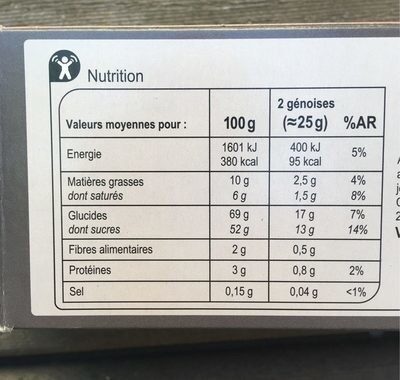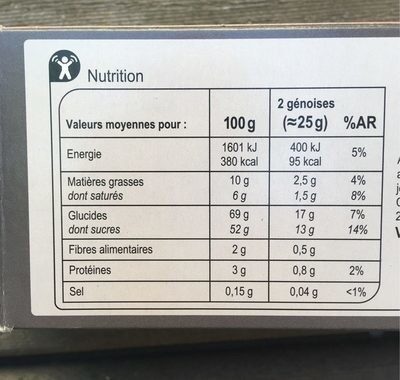Génoises saveur framboise nappage chocolat noir - Carrefour - 150 g
This product page is not complete. You can help to complete it by editing it and adding more data from the photos we have, or by taking more photos using the app for Android or iPhone/iPad. Thank you!
×
Some of the data for this product has been provided directly by the manufacturer Carrefour.
Barcode: 3560071062439 (EAN / EAN-13)
Common name: Génoises avec un fourrage (55%) à la framboise aromatisé et un nappage de chocolat noir.
Quantity: 150 g
Packaging: fr:Barquette plastique, fr:Carotn, fr:Film plastique
Brands: Carrefour
Categories: Snacks, Desserts, Sweet snacks, Biscuits and cakes, Jaffa cakes
Labels, certifications, awards:
Sustainable, Sustainable Palm Oil, Green Dot, Made in Germany, Roundtable on Sustainable Palm Oil

Stores: Carrefour, carrefour.fr
Matching with your preferences
Environment
Carbon footprint
Packaging
Transportation
Other information
Conservation conditions: À conserver à l'abri de la chaleur et de l'humidité. Pour une dégustation optimale, à consommer de préférence avant le : voir sur le côté du paquet.
Customer service: Interdis - TSA 91431 - 91343 MASSY Cedex - France.
Report a problem
Data sources
Product added on by kiliweb
Last edit of product page on by inf.
Product page also edited by alex-off, celine2018, date-limite-app, driveoff, ecoscore-impact-estimator, hangy, moon-rabbit, openfoodfacts-contributors, org-carrefour, packbot, quechoisir, roboto-app, teolemon, yuka.SDRSYUFxazhodWtrbjhJKzAwdU0xK0pYNmNDeVRIeTdCdlZLSUE9PQ, yuka.WFo0a041UWRxUGsybDhFTzhCSHArdTVUeExQMVoyMnZDdllXSVE9PQ, yuka.sY2b0xO6T85zoF3NwEKvll1Netjb_A3hDjPQvBDV7diQEY3mYvRQx7nRDqs.











